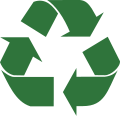- Downcycling
-
3R Concepts Downcycling is the process of converting waste materials or useless products into new materials or products of lesser quality and reduced functionality. The goal of downcycling is to prevent wasting potentially useful materials, reduce consumption of fresh raw materials, reduce energy usage, reduce air pollution and water pollution, and lower greenhouse gas emissions (though re-use of tainted toxic chemicals for other purposes can have the opposite effect) as compared to virgin production. A clear example is plastic recycling, which turns the material into lower grade plastics.
The term downcycling was used by Reiner Pilz in an interview by Thornton Kay of Salvo in 1994 [1].
We talked about the impending EU Demolition Waste Streams directive. "Recycling, he said, "I call it downcycling. They smash bricks, they smash everything. What we need is upcycling where old products are given more value not less." He despairs of the German situation and recalls the supply of a large quantity of reclaimed woodblock from an English supplier for a contract in Nuremberg while just down the road a load of similar blocks was scrapped. In the road outside his premises, was the result of the Germans' demolition waste recycling. It was a pinky looking aggregate with pieces of handmade brick, old tiles and discernible parts of useful old items mixed with crushed concrete. Is this the future for Europe?
The term downcycling was also used by William McDonough and Michael Braungart in their 2002 book Cradle to Cradle: Remaking the Way We Make Things [2].
As we have noted, most recycling is actually downcycling; it reduces the quality of a material over time. When plastics other than those found in soda and water bottles are recycled, they are mixed with different plastics to produce a hybrid of lower quality, which is then molded into something amorphous and cheap, such as a park bench or a speed bump... Aluminum is another valuable but constantly downcycled material. The typical soda can consists of two kinds of aluminum: the walls are composed of aluminum, manganese alloy with some magnesium, plus coatings and paint, while the harder top is aluminum magnesium alloy. In conventional recycling these materials are melted together, resulting in a weaker—and less useful—product.
Contents
Characteristics
- lower reusability (in comparison with "classic" recycling)
- lower amount of iterations inside the cycle
- with each iteration of downcycling:
- quality of downcycled things deteriorates
- their values diminishes
- requirements, standards or level of expectations (demanded by appropriate respective norms) back off
- after the last iteration the product has been downcycled to the par of general waste
Examples
- Breaking apart a computer hard drive to harvest the strong rare earth magnet set within.[3]
- Increasing the recycle number of plastic recyclables (see above)
- Recycling used office paper into toilet paper.
- Transferring disposable batteries to lower-power devices (e.g. taking batteries from a digital camera to use in a TV remote)
- Reusing defective car batteries for lower-power applications.
- Reusing towels for other cleaning environments. (Or cutting up old clothes to use as cleaning rags.)
- Oftentimes, when people upcycle, individually downcycled parts are often involved.
- Finding alternate purposes for obsolete technology. Such as using an older computer to play music while a newer computer is available for everyday purposes. Older MP3 players can play a similar role.
- Keeping an older vehicle on a commercial utility fleet as an "extra" vehicle in case the newer ones need routine maintenance. However the older vehicle needs less maintenance since it's used less.
- Water Bottle to Plastic Salad Dressing Bottle
- Plastic Salad Dressing Bottle to Quart of Milk
- Quart of Milk to Plastic Bag
- Print Paper to Cardboard
- Print Paper to Toilet Paper
- Crushing a reusable brick to create a very much cheaper recycled aggregate substitute. Apart from the loss of value there is also a loss of energy. The embodied energy of the old brick is destroyed when it is crushed, and additional process energy is usually needed to crush it. So recycled brick aggregate can be a doubly downcycled product, not only losing monetary value but also losing energy and increasing CO2 emissions. This is typical of much downcycling.
See also
References
- ^ Thornton Kay, Salvo in Germany - Reiner Pilz, p14 SalvoNEWS No99 11 October 1994 [1]
- ^ William, McDonough; Michael Braungart (2002). North Point Press. ed. Cradle to Cradle: Remaking the Way We Make Things. North Point Pr.. pp. 56–57. ISBN 9780865475878. http://www.mcdonough.com/cradle_to_cradle.htm.
- ^ "How To Scrap A Computer Hard Drive". http://scrappingmetal.blogspot.com/2010/11/hard-drives.html. Retrieved 2010-11-21.
Topics related to waste management Anaerobic digestion · Composting · Downcycling · Eco-industrial park · Incineration · Landfill · Materials recovery facility · Mechanical biological treatment · PullApart · Radioactive waste · High-level radioactive waste management · Recycling · Regift · Reuse · Septic tank · Sewerage · Sewage regulation and administration · Upcycling · Waste · Waste collection · Waste hierarchy · Waste legislation · Waste management · Waste management concepts · Waste sorting · Waste treatmentCategories:
Wikimedia Foundation. 2010.

